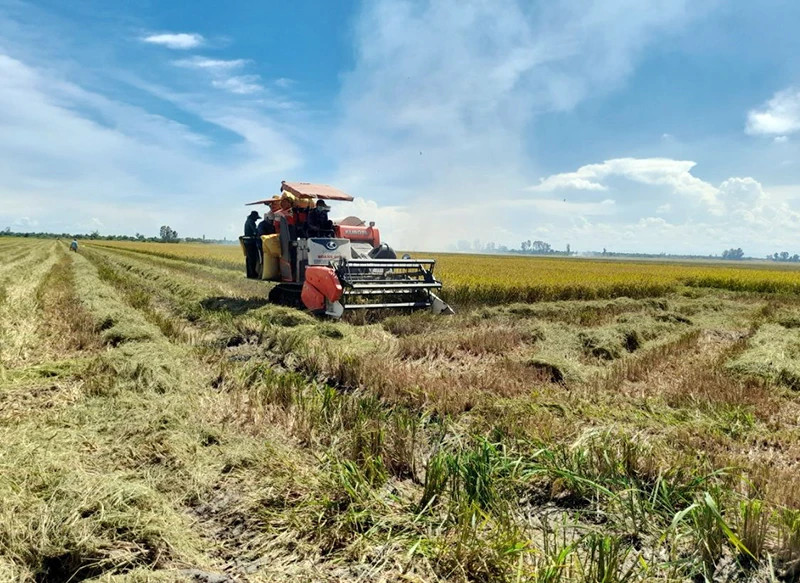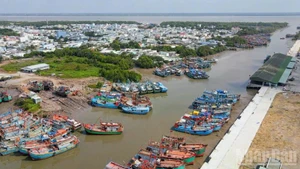According to Director of the Department of Economic Cooperation and Rural Development Le Duc Thinh, regarding the issue of linkages in the rice value chain, there is currently Decision No.80/2002/QD-TTg, on policies to encourage agricultural consumption and produce goods through contracts, Decision No. 62/2013/QD-TTg, on policies to encourage the development of cooperation and production links associated with agricultural product consumption and construction of large fields and Decree No.98/2018/ND-CP, on policies to encourage the development of cooperation and association in the production and consumption of agricultural products.
Therefore, in recent times, value chain links have improved towards model diversity and more sustainable models. However, the scale of area, output, and number of farmer households participating in the association are still small,with limited cooperatives and businesses linked,andmany unsustainable links, such as changing partners, not implementing contracts properly or performing intermittently.
There are currently only a few large enterprises following the chain of links from production, harvesting, preservation and processing, with the majorityin the form of unsustainable buying and selling. Meanwhile, the current trend of developing rice production in the Mekong Delta provinces is to use high-quality and certified seeds, apply advanced farming processes,high technology and smart technology to adapt to climate change and apply planting area codes and traceability, more than ever, the issue of value chain linkage needs to be promoted.
However, in localities, because the number of businesses doing business in the field of rice processing and exporting, with large-scale factories andlarge processing capacity is still very few, so in recent times, the buying and selling of rice using the trader system in the Mekong Delta is very popular.
According to the Soc Trang Provincial Agricultural Extension Centre, rice output in the entire province is 2.1 million tonnes/year and of the total 147,681 hectares of rice cultivation, only 17% of the area has chain links, the rest are mainly through traders.
In Soc Trang, traders are an important link in solving many diverse problems in rice trading, such as: being flexible, responsive, and quick in pricing and negotiating prices; flexible and efficient in moving means of transport to suit specific conditions; sharing pressure on working capital with purchasing and processing enterprises; flexible payment methods to meet farmers' requirements; detecting and actively reporting to local authorities about problems in waterway and road transport infrastructure serving the circulation of agricultural goods.
Faced with that reality, to form a sustainable rice value chain, it is necessary to pay attention to the role of traders,and invitetraders to officially participate in the chain linking of each locality. The chain of links will include key rice trading enterprises, the trader system of businesses operating in the area, intermediary brokerage systems, community agricultural extension groups, government and the agricultural industry of localities.
According to Vice Principal of the School of Public Policy and Rural Development Tran Minh Hai, to have multi-dimensional benefits when bringing traders into the sustainable rice chain, traders need to have a "practising certificate" and be considered partners with farmers, cooperatives and businesses.
It is necessary to encourage traders to gather into groups and clubs voluntarily to exchange experiences and provide training on preservation, transportation, processing, quality assurance, and food hygiene and safety techniques, thus reducing the situation of "breaking deals", saying no to unhealthy behaviours, such as buying and selling poor quality agricultural products or profiteering, colluding, causing division, and negatively impacting prices.
In Directive No.10/CT-TTg dated March 2, 2024, on promoting sustainable, transparent and effective rice production, business and export in the new situation, the Prime Minister requested the Ministry of Agriculture and Rural Development to direct to accelerate the construction and replication of rice consumption chain models to ensure harmony of benefits between people and businesses.
Meanwhile, the Ministry of Industry and Trade was asked to preside and coordinate with the Ministry of Agriculture and Rural Development and localities, to research and build pilot models to bring traders into the value chain of the rice industry, to promote its role as a bridge between farmers and businesses, while limiting possible risks to parties participating in the value chain.
















